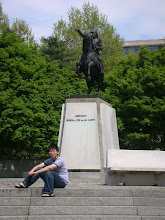Titled "Are the Arabs already extinct?" Asia Times Online columnist Spengler mercilessly divulged a starling state-of-being of the Arabs and all those in the Middle East. The esteemed columnists introduces Adonis, a Syrian poet who laments that "[Arabs] have become extinct ... We have the masses of people, but a people becomes extinct when it no longer has a creative capacity, and the capacity to change its world".
One may shrug off the poet and criticize Spengler for taking a literary comment too far, but the article delves much deeper. For example, the Arab world "translates only a fifth as many books per year as does Greece, with a 30th of the population. Arab writers of global stature are a tiny number, and their importance is disproportionately great." Indeed these figures alone place much doubt upon the capacity of the Arab world to integrate into the vastly diversifying and mobile world around them.
Adonis places some blame upon Islam which "not only suppresses the possibility of poetic expression... but with it the capacity of the individual to have a personality. It is an astonishing, terrifying, and absolute indictment of [Arab] culture." I cannot say whether this perspective from one poet stands true in Syria as well as Morocco, Indonesia, or Senegal, all prominent Muslim societies. To call Islam the root of societal decline is an incredibly dubious claim. However, from what I have seen in Egypt and in the United States, I must agree with certain aspects of Spengler and Adonis' claim on the suppression of expression.
One may shrug off the poet and criticize Spengler for taking a literary comment too far, but the article delves much deeper. For example, the Arab world "translates only a fifth as many books per year as does Greece, with a 30th of the population. Arab writers of global stature are a tiny number, and their importance is disproportionately great." Indeed these figures alone place much doubt upon the capacity of the Arab world to integrate into the vastly diversifying and mobile world around them.
Adonis places some blame upon Islam which "not only suppresses the possibility of poetic expression... but with it the capacity of the individual to have a personality. It is an astonishing, terrifying, and absolute indictment of [Arab] culture." I cannot say whether this perspective from one poet stands true in Syria as well as Morocco, Indonesia, or Senegal, all prominent Muslim societies. To call Islam the root of societal decline is an incredibly dubious claim. However, from what I have seen in Egypt and in the United States, I must agree with certain aspects of Spengler and Adonis' claim on the suppression of expression.
Riding on the Cairo subway one always notices a number of people reading. An Arab society is a literate one regardless of whether or not it is consuming foreign thoughts and expressions. (They may still be functionally illiterate, the inability to read beyond the text in order to interpret and critique for themselves... something many Americans have succumb to) Yet, the vast majority of the people reading on the subway are reading the Koran. A vast jump from the DC metro where vast numbers of people seem to read newspapers or works of fiction. Interpret this as you wish.
Another feature is in the way in which many Muslims in the United States preach "plural monoculturalism", a term I came across in works by Amartya Sen. Many Muslim organizations in the United States (especially student ones) utilize the shield of pluralism against any critiques or criticism against the Arab/Muslim world and religion. They accept the benefits of a plural society but refuse to alter their interactions with other cultures within this plural society. This seems like a bigoted conclusion by someone outside the Muslim community, but this is the predicament of Muslim communities in Europe and the Americas. It is essentially what Sarkozy points out in his (in)famous remark. Plural monoculturalism is divisive and we eventually end up with a society that is exremely suspicious of one another. Domestic terrorism in Britain is an advanced symptom of this issue.
While I am on the issue, I have noticed that Muslim student organizations that have observed often utilize the defense that terrorists and insurgents are not acting in accordance with their faith. I have always felt that this was a double edged argument. It indicates that there is a certain way in which a person of the Muslim faith should act. It does not offer an alternative individual identity other than being Muslim. This would mean that a terrorist who is Muslim can only have a single misguided purpose of purging the world of sinners and apostates. Nationalism, political and economic equity, and dignity cannot be the primary motivating factors. Of course many claim to represent Islam when committing acts of terror, but to extensively classify how a Muslim should act like is a means of devolving into gross puritanicalism before which many American muslims will appear hypocritical.
Back to the Arab world, the issue of uncreative construction is one which branches from society and culture into politics and economics. A more open and discursive society is necessary.
In terms of where Egypt can start... before we even get into fair elections and ridding the country of the dreadfully inefficient subsidies... the government needs to bring down its bloody knuckles upon those that harrass women. When half of one's country is left without proper dignity on the streets, discourse or anything will get nowhere. Only stagnation.

No comments:
Post a Comment